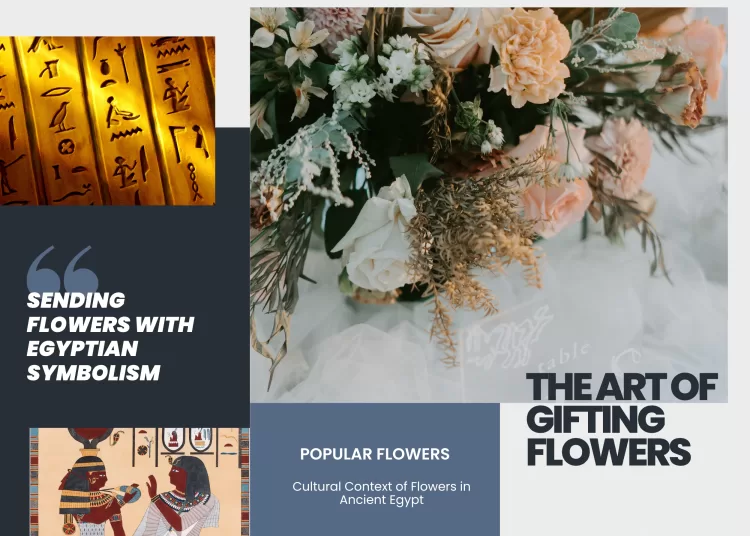Throughout history, the act of giving flowers has transcended mere aesthetic pleasure, embodying layers of meaning and sentiment. In various cultures, flowers carry specific symbolic weight; none more so than in ancient Egypt, where they were steeped in religious significance, cultural customs, and profound meanings. The art of gifting flowers is not just about presenting a beautiful bouquet but about conveying a message rooted in centuries of tradition. If you want to Send Flowers Internationally, explore the various flowers laden with Egyptian symbolism, history, and meaning in our article.
Understanding the Cultural Context of Flowers in Ancient Egypt
● Sacred Representations. In ancient Egyptian culture, flowers were seen as sacred representations of the divine and nature’s cycles.
● Integral to Rituals. Flowers played a significant role in religious rituals, funerary practices, and daily life, often associated with gods and goddesses, symbolizing rebirth, resurrection, and eternity.
● Communication with the Divine. Egyptians believed flowers had the power to communicate messages from the earthly realm to the heavens.
● Adornments and Temples. Flowers were used in personal adornments, temples, and tombs to honor the deceased, often placed in the hands of the dead or used in ceremonial embalming.
● Modern Symbolism. Sending flowers today inspired by ancient Egyptian symbolism honors that legacy and conveys sentiments in a profound and culturally resonant manner.
Popular Flowers and Their Egyptian Symbolism
Lotus
The lotus flower is one of the most powerful symbols in ancient Egypt, representing purity, rebirth, and the cycle of life. According to Egyptian mythology, the lotus emerged from the waters of chaos at the beginning of creation. It was associated with the sun god Ra and the goddess Isis, symbolizing the divine and the transformative power of nature.
Gifting Context: Sending a lotus flower bouquet is ideal for occasions of new beginnings, such as weddings, births, or graduations. It conveys wishes of purity and a fresh start, making it an appropriate gift for anyone embarking on a new journey.
Papyrus
The papyrus plant, characterized by its tall stems and bushy tops, was crucial to ancient Egyptian life, serving as a primary material for making paper. It is symbolically linked to knowledge, wisdom, and communication. Papyrus was often used in the creation of scrolls, which contained all manners of texts, from sacred scriptures to literature.
Gifting Context: A bouquet that incorporates elements of papyrus can symbolize a wish for knowledge and success. It makes for a thoughtful gift to students or those pursuing intellectual endeavors.
Dandelion
While not originally native to Egypt, the dandelion represents resilience and adaptability. In the context of Egyptian symbolism, it can be associated with hope and the endless cycle of life, given that it can thrive in various environments and conditions.
Gifting Context: A bouquet of dandelions can serve as a cheerful gift to inspire resilience and positivity. It’s an excellent choice for someone going through tough times, symbolizing the ability to overcome adversity.
Lily
The lily, especially the white lily, was regarded as sacred and associated with the goddess Isis. It symbolized fertility, motherhood, and the divine feminine. Lilies were often used in funerary practices, symbolizing resurrection and the hope of rebirth.
Gifting Context: Gifting white lilies is appropriate for expressing sympathy and wishes of comfort during times of loss, or to celebrate the nurturing nature of motherhood on Mother’s Day or at baby showers.
Acacia
The acacia tree is highly revered in Egyptian culture, often associated with immortality and eternal life. Its resilient nature is a testament to strength and longevity. The acacia was commonly used in ancient burial rituals, symbolizing the transition of the soul into the afterlife.
Gifting Context: An acacia arrangement could be a thoughtful gift for someone grieving a loss, symbolizing eternal life and the enduring nature of memory. It can also be a gesture of congratulations for achieving a milestone, embodying wishes for continued success and longevity.
Choosing the Right Flowers for Specific Occasions
When selecting flowers with Egyptian symbolism for gifting, consider the occasion and the recipient’s personal connection to the flower’s meaning. Understanding the underlying messages enhances the gift’s impact and demonstrates thoughtfulness. Below are some tips for gifting flowers in culturally significant ways:
Know Your Recipient
Consider the personality, preferences, and circumstances of the individual receiving the flowers. Different flowers carry different meanings, and a well-chosen bouquet can provide comfort or joy in just the right way.
Occasion-Specific Selections
● Celebrations (Weddings, Graduations). Opt for lotus or lily arrangements that symbolize new beginnings and achievements.
● Congratulatory Gifts. Send acacia flowers to signify longevity and honor their accomplishments.
● Sympathy or Comfort. White lilies or dandelions can provide solace in times of grief.
Create a Narrative
When presenting the flowers, consider sharing the symbolic meanings behind them. This added layer of depth transforms a simple act of gifting into an experience that connects the recipient with rich historical narratives.
The act of gifting flowers holds a silent yet profound language, especially when interwoven with the historical richness of Egyptian symbolism. By choosing flowers that resonate with meaningful traditions, you not only express your thoughts and feelings but also connect recipients to a larger tapestry of human experience, culture, and spirituality. As you explore the art of gifting, let the vibrance of Egyptian symbolism guide you, making each bouquet not just a gift, but a heartfelt message steeped in history and significance.






Discussion about this post